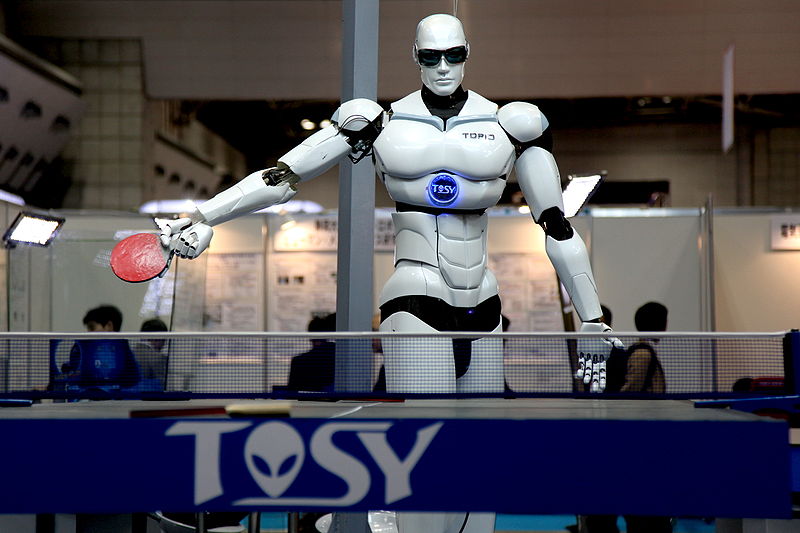Difference between revisions of "Android"
Caseorganic (Talk | contribs) |
Caseorganic (Talk | contribs) m |
||
| Line 1: | Line 1: | ||
[[Image:topio-robot-ping-pong.jpg|450px|thumb|right|Ping Pong Playing [[Android]].]] | [[Image:topio-robot-ping-pong.jpg|450px|thumb|right|Ping Pong Playing [[Android]].]] | ||
===Definition=== | ===Definition=== | ||
| − | An android is an artificial machine with specifically human features. "Automaton resembling a human being," 1727, from Mod.L. androides, from Gk. andro- "human" (see andro-) + eides "form, shape." | + | An android is an artificial machine with specifically human features. "Automaton resembling a human being," 1727, from Mod.L. androides, from Gk. andro- "human" (see andro-) + eides "form, shape." The term was popularized in 1951 by science fiction writers.<ref>[ http://www.etymonline.com/index.php?term=android Etymology Online Dictionary - Entry on Android]</ref> |
| + | |||
| + | The first use of the word Android in Science Fiction is unknown, but "Clute and Nicholls' Encylopedia of Science Fiction traces the first modern use to Jack Williamson's The Cometeers (1936, book version 1950). The distinction between mechanical robots and organic androids was popularized by Edmond Hamilton in his Captain Future series a few years later, and had become a feature of mainstream press discussion of SF by 1958".<ref>[http://www.catb.org/~esr/sf-words/glossary.html An SF Glossary]</ref> | ||
===Androids in Contemporary Cyborg Cinema=== | ===Androids in Contemporary Cyborg Cinema=== | ||
| Line 7: | Line 9: | ||
"Schelde’s Androids, Humanoids and Other Science Fiction Monsters (1993) adopts the intriguing method of viewing SF films as a modern version of folklore, with technology substituted for magic and Capitalist corporations serving as the giants that must be fought".<ref>Ibid, 26</ref> | "Schelde’s Androids, Humanoids and Other Science Fiction Monsters (1993) adopts the intriguing method of viewing SF films as a modern version of folklore, with technology substituted for magic and Capitalist corporations serving as the giants that must be fought".<ref>Ibid, 26</ref> | ||
| + | |||
| + | ===Related Reading=== | ||
| + | *[[Robot]] | ||
==References== | ==References== | ||
Revision as of 19:50, 6 March 2011
Definition
An android is an artificial machine with specifically human features. "Automaton resembling a human being," 1727, from Mod.L. androides, from Gk. andro- "human" (see andro-) + eides "form, shape." The term was popularized in 1951 by science fiction writers.[1]
The first use of the word Android in Science Fiction is unknown, but "Clute and Nicholls' Encylopedia of Science Fiction traces the first modern use to Jack Williamson's The Cometeers (1936, book version 1950). The distinction between mechanical robots and organic androids was popularized by Edmond Hamilton in his Captain Future series a few years later, and had become a feature of mainstream press discussion of SF by 1958".[2]
Androids in Contemporary Cyborg Cinema
"Both Star Trek’s Data and Blade Runner’s replicates have been interpreted as minority figures whose attempts to ‘pass’ as human can be affiliated with concerns of nationalism, race and the idea of purity". [3]
"Schelde’s Androids, Humanoids and Other Science Fiction Monsters (1993) adopts the intriguing method of viewing SF films as a modern version of folklore, with technology substituted for magic and Capitalist corporations serving as the giants that must be fought".[4]
Related Reading
References
- ↑ [ http://www.etymonline.com/index.php?term=android Etymology Online Dictionary - Entry on Android]
- ↑ An SF Glossary
- ↑ Short, Sue. Cyborg Cinema and Contemporary Subjectivity. Faculty of Continuing Education Birkbeck College, University of London, UK PALGRAVE MACMILLAN 2005.
- ↑ Ibid, 26
